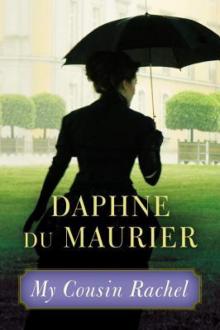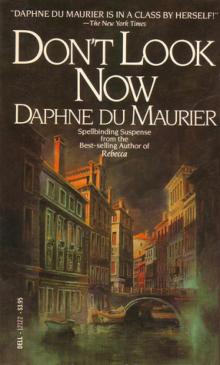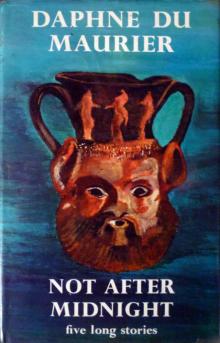- Home
- Daphne Du Maurier
Rule Britannia Page 10
Rule Britannia Read online
Page 10
“I don’t know,” said Emma. “No one seems to be awake yet. I’ll go and see.”
She went along to the elder boys’ room and knocked on the door. There was no answer. The room was empty. She looked out of the window and there was Joe already at work, bless him, though it was almost too dark to see the logs he was piling into the wheelbarrow. Terry’s bed had not been slept in. She went back to the cloakroom. But when she lifted the receiver there were voices talking, and with a sinking heart she realized that the bell had awakened Mad after all, she was speaking to Mr. Trembath.
“He could have gone home with one of the boys from the tech,” she was saying. “I saw two or three of them on the beach last night. Unless he’s sleeping soundly in his own bed. Do you say Emma’s gone to look?”
“He isn’t there,” put in Emma, joining the conversation, “his bed hasn’t been slept in.”
“Well, don’t worry,” her grandmother said from upstairs. “Terry can look after himself. He’ll turn up.”
“I hope so,” came the answer, but the farmer sounded anxious.
There was a click from the bedroom extension and Jack Trembath said, “Hullo? Are you still there?”
“I am,” replied Emma. “I’m downstairs. My grandmother has rung off.”
“The reason I telephoned,” he said, and his voice was lower than before, “is that I’ve just been listening to the seven o’clock local news. There was quite a bit about the scuffle last night between our local lads and the marines. The marines set up these roadblocks everywhere, and it seems they’ve taken a number of lads into custody, but they don’t say where. I’m only hoping your Terry isn’t among them.”
“Oh, no…”
“I wouldn’t have your grandmother worried for the world, but if she listens to the radio it’s bound to be repeated at eight o’clock. Peggy will bring your car round for you. One of my heifers has gone sick and I have to see to her. We’ll keep hoping Terry will turn up.”
Emma replaced the receiver. Mad would be bound to turn on her radio at eight o’clock, and then what? Supposing the marines had picked up Terry, what would they do to him? She went upstairs to her bedroom, dressed hurriedly, and then ran down and out into the garden to tell Joe. He threw down his hoe.
“Madam mustn’t hear of this,” he said. “I’ll go and look for Terry.”
“But Mr. Trembath said they’ve got roadblocks everywhere, and you’ve not been issued with a pass yet. They might pick you up too.”
“Not if I go by the cliffs,” he told her. “Terry may have got wind of the search, and be sheltering down by our beach in one of the caves.”
“But why should he do that?” Emma asked. “He could just as well have gone to the farm or come back home?”
Joe shook his head. “I don’t know. Some of them might have spotted him down on the beach and gone after him, and he had to hide. He knows those cliffs. Could travel them blindfolded. Not like those fellows.”
He followed her back into the house. It was beginning to rain. Emma looked out to sea, and saw the weather was coming up black and gray from the southwest. The warship at anchor in the bay was almost blotted out.
“Don’t go,” she pleaded. “Please, Joe, don’t go. We just don’t know what’s happening. If they’ve got Terry they could get you too. What would we all do then? We can’t be left alone in the house without you.”
The stubborn expression vanished from Joe’s face, and in its place came a kind of serenity, as if whatever burdens might be put upon him they could be shouldered. The weight would never be too hard to bear.
“I’d never leave you and Madam alone, you know that,” he said. “You and she are the only things I have.”
They stood for a moment in the porch, debating silently whether he should go or stay, while the rain pattered down on the glass roof overhead, and this is one of those moments I shall remember, Emma thought, no matter what happens, and when I’m nearly eighty, as old as Mad is now, I shall think of Joe standing here, his future all uncertain, and forever limited because of being unable to read or write, he depending upon us and we on him. This is union, this is love, it’s something to do with trust and being brought up together without ties of blood; we share a common faith, a common home.
“Emma?”
It was Dottie from the kitchen, already astir, and laughter and chatter from the little boys on the move, the turmoil of the long day had begun.
“Wait,” said Emma to Joe, “wait until I know what Mad is doing, she must have rung for her orange juice.”
The radio was already blaring as she went into the kitchen. “Several youths and young men,” the announcer was saying, “have already been picked up on suspicion of having taken part in last night’s disorderly scenes after the fireworks display on Poldrea beach. Colonel Cheeseman has stated that he is assuming full responsibility for dealing with the incident. Anyone who is believed to have taken part will be held in custody until they can give proof of their innocence. The parents or relatives of any missing persons should apply to Colonel Cheeseman personally or in writing, and information will be given to them.”
Dottie, who knew nothing of Terry’s absence, handed Mad’s tray into Emma’s hands.
“That will teach them a lesson,” she said. “A lot of young hooligans from St. Austell, I suppose. Do them good to have a touch of marine discipline.”
Emma did not answer. She went quickly upstairs with the tray to her grandmother’s bedroom. Mad was already dressed and she had the telephone in her hand.
“I want the Commander-in-Chief at Devonport,” she was saying. “Rear-Admiral Sir James Jollif.”
She waited, nodding meanwhile to Emma to put the tray on the table beside her bed.
“I tried the police first,” she said, “after I heard the eight o’clock news. They don’t have any information. I asked how one could get in touch with the U.S. Commander. They gave me a number, which I rang, and the American voice that answered said the Commander was taking no calls himself, and if there was anything I wanted to know, would I apply in person or in writing. So I’m trying Jimmy Jollif. He at least will give me some advice.”
There was a long delay before she got him. At first some subordinate tried to make an excuse. Finally the Admiral himself came on the line.
“Yes,” said Mad, in a voice that must have rung through Devonport headquarters, “it is me. Didn’t they tell you? Listen, I think one of my boys, Terry, may have been picked up by the marines last night. We were all down on Poldrea beach, and as you may have heard there was some sort of skirmish between local boys and their lot. I can’t get any sense out of the American Marine Corps or whatever they call themselves. Can you find out for me whether they’re holding Terry? What do you mean it’s nothing to do with you? Aren’t you in touch with the Commander? Serious offence? How can throwing a few fireworks around be a serious offence? I’ve never heard of anything so ridiculous in my life! You mean to tell me that you, Admiral Sir James Jollif, can’t have a private word with that jumped-up American marine and tell him where he gets off? What? I don’t believe it!” A look of incredulity appeared on her face and she made large gestures at Emma. “Colonel Cheesering has complete jurisdiction in this area and it wouldn’t be either politic or right to question his motives? Yes, I should think you are sorry. More than that, if I were in your place I should feel humiliated. USUK, indeed! Right, don’t say another word. Good luck to you. Good-bye.”
She slammed down the telephone.
“Now we know where we are,” she said to Emma. “It isn’t just a takeover bid, it’s capitulation. We’re on our own. Thank God I’ve got my health and strength, though I may be touching eighty. Give me a piece of paper and a pencil, Em, and my specs. We’ve got to organize.”
8
The council of war was held in the library. Mad insisted that everyone should be present, from Dottie to Ben. “I don’t believe,” she said to Emma, “in children being told to run away and play when seri
ous things are going on all round them. They should take part in decisions. Even if their opinions are immature, they very often see things clearer than we do.” So briefly, while they gathered around her, some on the window seat, the younger boys on the floor, Dottie on the inevitable upright chair, Mad explained what had happened. Her task was made all the easier because they had heard the news over the kitchen radio, and the very fact that it was about Poldrea, their own territory, and they themselves had witnessed the scenes described, made solidarity firm among Andy, Sam and Colin. They were outraged. So was Dottie, who had instantly switched sides once she knew Terry might be involved. Dottie, when she was baited by Terry, as she frequently was, would allude to him as “that boy”; but if he was in any sort of trouble that did not concern her, then her first nursling became “my boy.”
“If they try to do anything to my boy,” she said, “I’ll send a telegram to the Queen, even if she is staying at the White House.”
Ben nodded his head and began to purse his lips. “C… c…”
Emma reached for a lump of sugar, intended for Folly’s broken molars, and pushed it into his mouth.
“I don’t really think, Dottie dear,” said Mad, “that we should gain anything by appealing to the Queen. She’s probably being held as a hostage herself. Yes, Andy?”
Andy shook his mop of brown hair out of his eyes and lowered the hand that had shot into the air. He was a rapid thinker, but spoke deliberately.
“Talking of hostages,” he said, “I don’t see why we can’t take one of our own and make him talk. We have two possible choices. That Lieutenant Sherman or that Corporal Wagg. It’s only a matter of luring either the one or the other up here, and then…” He made a karate gesture, followed by a thumb slice across his throat.
“Oh, Andy!” exclaimed Dottie horrified. “What a thing to suggest!”
“I don’t know,” said Mad thoughtfully. “It isn’t a bad idea. We wouldn’t have to cut his throat necessarily, but a little gentle persuasion…” She glanced at her granddaughter. “You spent some time on the beach with him last night,” she went on, “Lieutenant Sherman, that is. How do you rate yourself as an inquisitor?”
“Not very high,” replied Emma, blushing—when would she outgrow the infuriating habit? “What I mean is, it would depend upon the circumstances, what was happening at the time. He’s rather nice, just to talk to casually, but it was he who got angry last night when someone threw those fireworks into Colonel Cheeseman’s car.”
“Incidentally,” interrupted her grandmother, “who did do that?”
Nobody answered.
“H’m, I thought so,” said Mad, and her eyes drifted towards Colin. His ingenuity was almost as great as her own.
“Have you got something to say?” she asked. “I don’t mean about the car, but about the situation as a whole?”
“I think what Andy suggested is very good,” Colin said, “but it would be better to get Corporal Wagg here, and not the lieutenant. Emma would give the show away if the lieutenant came, she would go red. Besides, Corporal Wagg isn’t so tall as the lieutenant, he’d be easier to handle. Now, Dottie can ask the corporal to tea…”
“I’ll do nothing of the sort,” interrupted Dottie.
“She will ask him to tea,” continued Colin, “and put a little nip of whiskey in the tea to loosen his tongue. Then she’ll take his arm and say, ‘Come for a stroll in the shrubbery, my dear’ ”—Colin did a fair imitation of Dottie’s voice—“and in the meantime Joe will have dug a pit, like the brethren did in the Bible, up at the top of the shrubbery where Madam throws the dead flowers, and wang! down will go Corporal Wagg to the bottom of it, his cries unheard. He’d soon talk after a night down there.”
Ben had finished his lump of sugar and he shouted applause. His speech might still be unformed, but there was nothing wrong with his lungs.
“’Scuse me,” said Sam, who was sitting huddled beside Joe on the window seat, “but I don’t quite see what we want either that lieutenant or the corporal to talk about. If they’ve got Terry they’ve got him. And he’ll be guarded, with all the other boys. Why doesn’t Madam just go down to Poldrea and call at the camp and find out?”
How obvious, thought Emma. After all, it’s what the announcer said on the news. It’s what Mad was told herself on the telephone. Could it be—and it seemed disloyal even to harbor the thought—that Mad was too proud, that she felt it would demean her to go down and possibly stand in a queue with a number of anxious parents and fill in a form and wait to be given information from some clerk in the Commander’s office?
“No,” said Joe firmly, “if Madam goes down to Poldrea and signs a form to say that Terry is missing, then if he isn’t among the boys they’ve picked up they will know he is absent from home. This will look suspicious. Whereas if we don’t say anything, the marines will never know that he isn’t here.”
Everyone was silent.
“I know one thing for sure,” Colin announced. “They’re the baddies and we’re the goodies, and it’s going to stay that way, so we may as well make up our minds to it. Come on, Ben, and I’ll teach you the word that Joseph said to his brethren when they bowed down their heads before him.”
“Mad,” said Emma suddenly, “I wonder if it would help if I went down to the farm and had a chat to Myrtle. She might know something about Terry that she hasn’t told her mother or her father. After all, I’m more her generation. And,” she hesitated, “I did see her on the beach last night with Corporal Wagg. She might even have made a date to see him again.”
“And then she could help by luring him here as a hostage?” suggested Andy.
Mad stood up. “The council is over for the moment. You boys go with Joe and do some work in the garden. All right, Em, go down to the farm and see what you can achieve. I shall ring up Bevil.”
Bevil was her doctor, and a family friend of many years’ standing.
“Why, darling?” asked Emma, alarmed. “Aren’t you feeling well?”
“Never felt better in my life,” replied her grandmother, “but by telling him I’ve got a sudden pain under the left ribs I shall get him out here. He’s the best source of reliable information I can think of.”
It was rather awful, Emma thought as she walked across the fields down to the farm, how this business is leading us all into subterfuge and deception, and we can’t really tell who is friend and who is enemy. Admiral Jollif, for instance, who might have been sympathetic and at least given Mad some words of advice, was evidently useless, and indeed probably forced by his position as C.-in-C. Devonport to connive with the American forces. He had said it was a joint enterprise and there was no getting round it. The same with Pa in London. If Terry really had been taken into detention and carted down to some place like St. Michael’s Mount, Pa would say, “Serve the young blighter right. He was always too big for his boots.” Secretly, Emma felt that Pa was jealous of Terry. Mad had been in the full flush of her acting career when Pa had been a boy and away at school. He probably thought that, in retirement, she gave much more thought and time to Terry than she had ever done to him.
People’s motives were always mixed, she decided. You took one side or another depending upon how it suited you, how it affected you. Mr. Libby at the Sailor’s Rest only welcomed the marines camping on Poldrea beach because they flocked into the inn to drink his beer. If they commandeered the inn as a headquarters and turned him out, he would be the first to want to blow up the entire beach. The man who sliced ham in the supermarket had visions of bigger and better hams stacking up his counters so that he could dispose of them to the Americans. Yet old Tom Bate… Old Tom Bate didn’t care about selling the fish he caught to the marines on shore or on board the warship in the bay. “Let them leave us be,” he would say, “we don’t need they telling us where we’m to.” The old mocked, the young threw sand and stones. It was only the middle-aged and the up-and-coming who collaborated with invaders.
The rain was driving into he
r face as she climbed the gate into the yard and made her way round to the farm kitchen. Peggy Trembath was rolling pastry. She was a bright, cheerful-looking woman of about forty, with her daughter Myrtle’s soft green eyes.
“Hullo, dear,” she said, “have you come for the car? Jack told me to drive it up to you an hour or more ago. I do apologize.”
“As a matter of fact, I’d forgotten all about the car,” confessed Emma, which was true. “No, I just came to report that we’ve had no news of Terry. I suppose you haven’t heard anything, or Myrtle?”
Mrs. Trembath shook her head. “I only wish we had,” she said. “I just pray to God he hasn’t been picked up with those other boys. Jack’s as baffled as I am. What we can’t understand is that if the Americans are supposed to be our friends, and we’re all one and the same, it’s a queer way to go about it, seizing a few high-spirited boys and taking them away goodness knows where. It just doesn’t make sense. Here, sit down, I’ll make you a cup of tea. Take your mac off and let it dry.”
“Where’s Myrtle?”
“She’s upstairs. I’ll call her down.” She made towards the stairs, then added confidentially, “She’s just as upset as we are. That shindy on the beach quite unsettled her last night. She was as white as a sheet when she came back with us in the car and hardly said a word. But whether it was all the noise and shouting, or worrying over Terry, I can’t make out.”
“I’ll go up to her,” said Emma quickly. “I don’t want any tea, truly. She might feel like talking to me.”
“All right, dear. I’ll put the kettle on, anyway. Jack and Mick will be in directly.”
Myrtle was lying on her bed, a transistor beside her. She looked startled when Emma appeared, and switched it off.
“I thought there might be some fresh announcement,” she said, “but there’s nothing. Is Terry back?”

 Jamaica Inn
Jamaica Inn The House on the Strand
The House on the Strand I'll Never Be Young Again
I'll Never Be Young Again Rebecca
Rebecca The Scapegoat
The Scapegoat The Birds and Other Stories
The Birds and Other Stories My Cousin Rachel
My Cousin Rachel Don't Look Now
Don't Look Now Mary Anne
Mary Anne Hungry Hill
Hungry Hill Don't Look Now and Other Stories
Don't Look Now and Other Stories The Loving Spirit
The Loving Spirit Rule Britannia
Rule Britannia The King's General
The King's General The Breaking Point: Short Stories
The Breaking Point: Short Stories The Flight of the Falcon
The Flight of the Falcon The Apple Tree: a short novel & several long stories
The Apple Tree: a short novel & several long stories The Breaking Point
The Breaking Point The Rebecca Notebook
The Rebecca Notebook The Winding Stair: Francis Bacon, His Rise and Fall
The Winding Stair: Francis Bacon, His Rise and Fall Not After Midnight & Other Stories
Not After Midnight & Other Stories The Doll
The Doll The Apple Tree
The Apple Tree